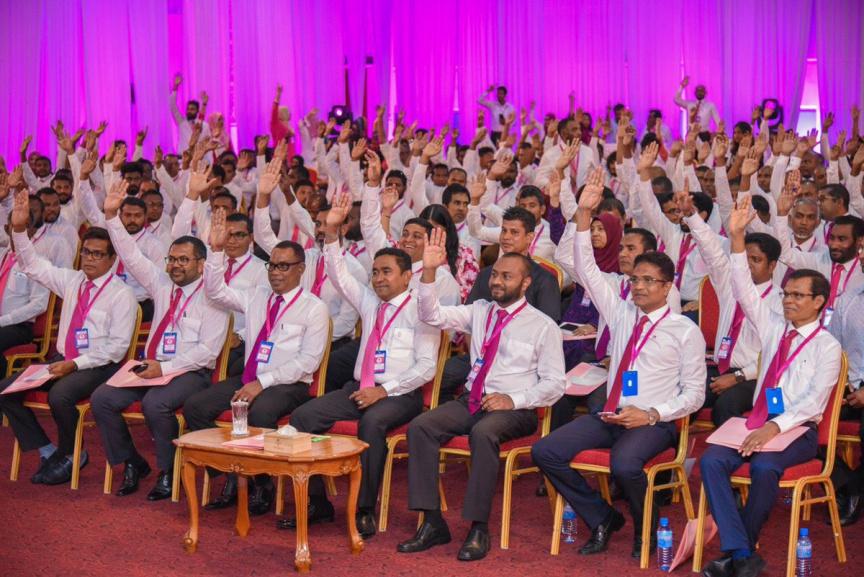
PPM members vote during its extraordinary congress at Dharubaaruge on September 28, 2018. (Photo/Twitter/PPM)
Elections Commission (EC) explained its reasons for refusing to endorse the extraordinary congress held by Progressive Party of Maldives (PPM) on September 28 and September 29 to High Court this Monday.
The Civil Court, in its 2016 ruling authorizing President Abdulla Yameen Abdul Gayoom control over PPM, instructed the party to hold a congress. But the party held its congress two years later, on September 28 and September 29, just after the presidential elections.
During this extraordinary congress, the party elected Yameen – who conceded defeat in the presidential elections – as the leader of PPM, and elected four deputy leaders to the party.
But the EC refused to endorse the congress, citing failure to honor proper procedure.
PPM alleged the EC’s refusal to endorse the congress as unlawful, and filed a case with the High Court.
The first hearing in the case was held this Monday.
Making his opening remarks, PPM’s attorney Abdulla Riyaz said the party invited two representatives from the EC to observe the congress. He said two representatives from EC attended the congress and did not contest any of the decisions made during the congress. Riyaz said the party also submitted details of the amendments made to PPM’s constitution and members elected to positions during the congress.
In response, EC’s attorney Riffath Abdulla said though it was true that representatives from the commission attended the congress, the PPM did not make an official invitation to the commission to observe the congress. And that EC only received a copy of the announcement for the congress.
Riffath also said that the PPM annulled four provisions in regulation for internal elections during a council meeting it held ahead of the congress, but failed to make a public announcement regarding the amendments. He said the EC has not received the seconds of the council meeting to this day. And that the party used the seconds of a 2016 council meeting and sent it instead as the seconds of the particular council meeting.
Riffath also said that documents were missing from the submission made by PPM to EC. And that EC sent a letter to the party informing it of the missing documents and asking it to submit all the necessary information.
He said that details of the voters at the congress, except for the first 50 names on the list, was missing in PPM’s submission – making it impossible for EC to check the authenticity of the voters. And that the voters list also includes names of 29 people who are not registered with any party, seven people registered with Maldives Development Alliance (MDA), two people registered with Dhivehi Rayyithunge Party (DRP), one person registered with Jumhoory Party (JP) and one person registered with People’s Alliance – which has been dissolved.
Riffath said the voting booths at the congress failed to comply with written regulation, and placed in a manner it ensured no secrecy. And that the election of the four deputy leaders violated the PPM’s constitution as Article 29 of the PPM constitution calls for three deputy leaders to be elected, but four were elected during the congress.
PPM has been granted three days to prepare for a response to the points made by EC.
The judges presiding over the case announced a second hearing will be held soon.
Meanwhile, two members of the PPM have filed a case with the High Court to authorize the former leader of PPM, former Maldivian President Maumoon Abdul Gayoom to run the party. Supreme Court recently took over the case.